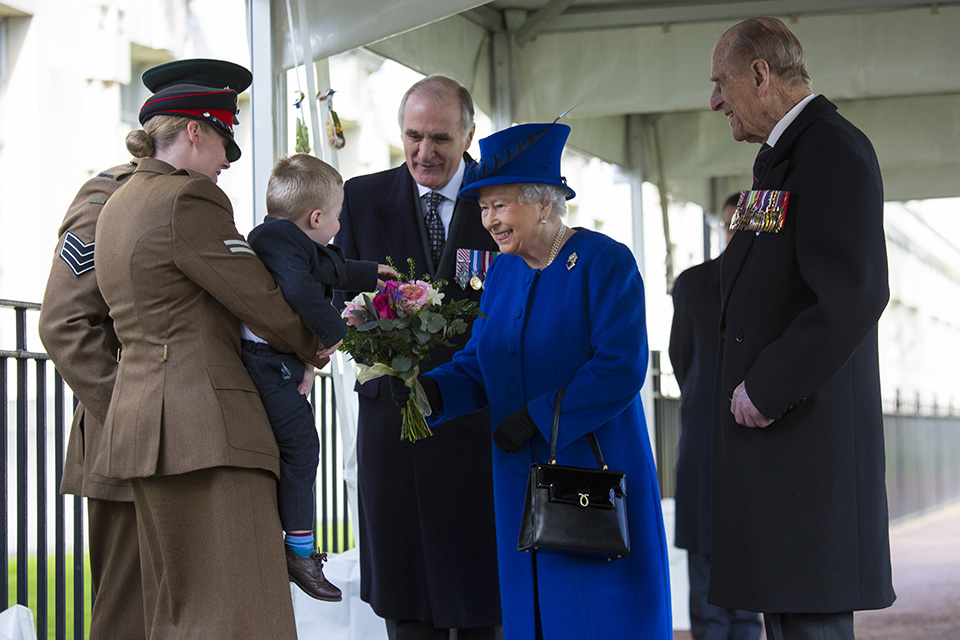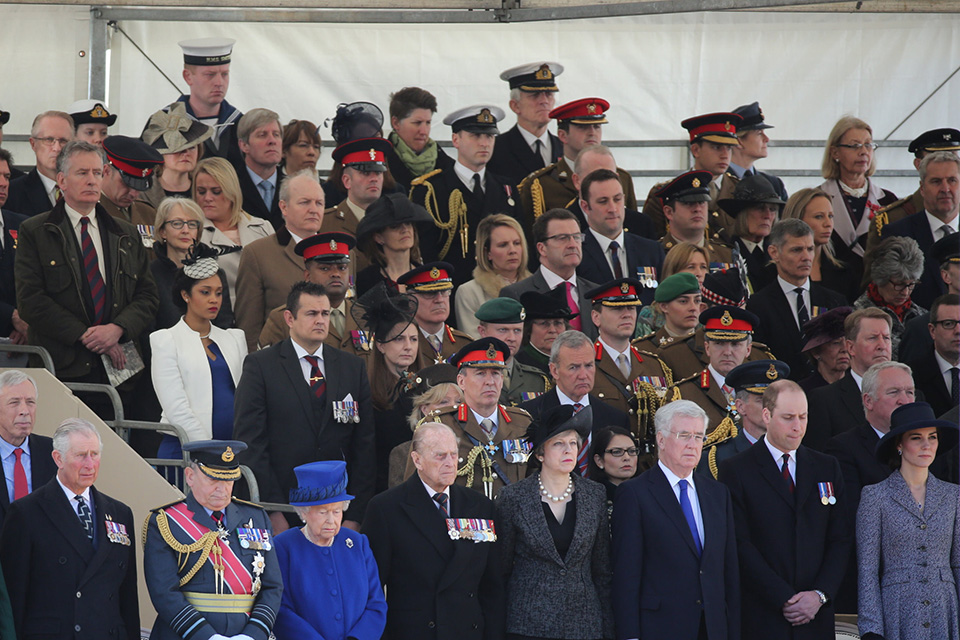Today, twenty DFID staff who have served in Iraq and Afghanistan joined the International Development Secretary, Priti Patel, and over 2,500 other British citizens and military personnel at the unveiling by Her Majesty The Queen of the Iraq and Afghanistan memorial in London.
The DFID staff selected were invited to represent all DFID staff who have served in Iraq and Afghanistan since 2001. Priti Patel met the group ahead of the ceremony and said:
Today we recognise all those who served in Afghanistan, Iraq and the Gulf, both military and civilian. The whole country can be proud of these brave men and women who, without a moment’s hesitation, deployed to some of the world’s most dangerous places.
We rightly commemorate their achievements – in terms of protecting Britain’s security and improving the lives of people caught up in conflict.
Here we profile just a few of the DFID staff who attended the ceremony on behalf of their colleagues.
Wendy Phillips
Wendy has conducted 3 separate DFID tours of Afghanistan, and is DFID’s representative to meet Her Majesty The Queen as part of the Iraq and Aghanistan memorial unveiling ceremony. Originally from Nunhead in South East London, Wendy now lives in Stowmarket.
In 2003, Wendy was Deputy Head of DFID’s office in Kabul for a period of 18 months.
In 2005, she went back to Afghanistan as part of the command structure in the Provincial Reconstruction Team (PRT) in Helmand, working alongside UK and international military colleagues to improve security for development agencies to enable them to work in Helmand.
Since 2014 Wendy has been back in Afghanistan again, looking after the day-to-day running of DFID’s office and the welfare of its staff. She is due to retire at the end of 2017.
Commenting on being invited to the memorial ceremony, Wendy said:
I was so surprised but pleased to be invited today; I’ve flown back especially for it. Being recognised in this way after a 41 year career in DFID is incredibly humbling.
I think that it is right we are commemorating the efforts of all those who worked in Afghanistan, Iraq and the Gulf, not just the military but the civilians too. With operations of that scale, there are so many people involved, and still are today. Everyone who took part was a cog in a much bigger wheel; everyone had an important role to play, and it is right and proper that we’ve marked that down in history.
In Afghanistan we knew it was going to be tough and we knew change would be incremental. But we are in it for the long haul and we are starting to see real reform in the country.
UK support has helped to ensure more than 7.2 million children now attend school, 39% of who are girls, and the Government of Afghanistan are also making more positive commitments, changing the way they operate for the better which will make the biggest difference of all.
Wendy’s son, Corporal Phillips of the Army Air Corps, attended the event with her. Corporal Phillips has also conducted 3 tours of Afghanistan.
Christa Rottensteiner
Christa was born in Vienna, Austria, but lives in Clapham, London. She has worked in DFID for 11 years, and was posted in Afghanistan from 2012-2013 as DFID’s local government team leader.
Christa oversaw the delivery of DFID programmes that supported local authorities to deliver basic services such as water, drainage systems, waste collection and electricity, to people in remote parts of Afghanistan. She also worked on projects that improved Afghanistan’s local governance structure, making it more effective and efficient.
Reflecting on her time in Afghanistan, Christa says:
My lasting memories are of speaking to committed, fearless women who are making a difference despite the difficulties. I feel privileged to have been able to work in Afghanistan alongside so many committed DFID Afghan staff.
Adam Farley
Adam is originally from Cornwall and went to school in Plymouth. From 2013-2014 he was the Infrastructure Programme Manager in DFID Afghanistan, overseeing programmes that gave Afghans better access to power, safer and more modern roads and a freight railway in the north to help increase trade with its regional partners.
The projects that Adam that Adam worked on helped to connect more villages and towns, which meant that more people could reach the services they desperately needed. Creating formal roads also increased safety and as part of the wider project, DFID helped train local workers to maintain what had been initiated.
Speaking ahead of the memorial ceremony, Adam said:
I wanted to come today and pay my respects. I am pleased that both civilians and members of the military are acknowledged with this memorial. We often, quite rightly, commemorate the military for their brave and selfless acts, but this has been a real team effort and recognising the joined up endeavour is right and proper.
None of us had to go to Afghanistan, we choose to because we wanted to make a difference in our own way.
Helen Jones
Helen (far left in picture above) was born in Ealing, London. She now lives in Hampshire, and has worked for DFID for 5 years.
From 2013-14 she was Deputy Head of DFID’s Socio-Economic Development Team in Helmand, Afghanistan, where she worked alongside government authorities to help them improve the planning, budgeting and delivery and maintenance of local services – including health facilities, access to schools, access to water, electricity and road maintenance – at provincial and district level. One of the team’s primary functions was also to capacity build, equipping the population with the skills necessary to plan and deliver these vital services.
Helen said:
I am very pleased that both civilians and members of the military are acknowledged by the memorial unveiled today. It was a real team effort in Afghanistan, in every sense of the word, and it’s right that this team effort is being recognised.
Her lasting memories of her time in Afghanistan are her admiration for the brave women of Helmand who put their lives on the line to make a difference – those who were involved in governing, female police officers and those who risked their lives to vote in elections.
Clare Moye
Clare is from Beckenham in Kent and has worked for DFID for 17 years. From 2004-2005 she was Deputy Head of DFID’s office in Basra. She returned to the country from 2009-2010, as Programme Manager for DFID’s work in Southern Iraq, based in Baghdad.
Her primary objective in Basra was to ensure the safety of DFID staff there, as well as supporting the development of DFID’s bilateral programmes. Whilst in Baghdad she managed a pilot youth employment programme which saw DFID working in conjunction with the Iraqi Government and local colleges to get young people into formal training: eg welding, building, sewing, mechanics, and from there into jobs.
Clare also helped monitor elections in Iraq. She remembers seeing and speaking to queues of families going to vote and they all told her how important the day was to them and their country.
I think that it is absolutely right that we are commemorating the efforts of all those who worked in Iraq, Afghanistan and the Gulf, and not just the military personnel but the civilians too”, she says.
The responses to those conflicts are on such a huge scale, take so many years and involve so many people, it is right that everyone who played a role is recognised.

